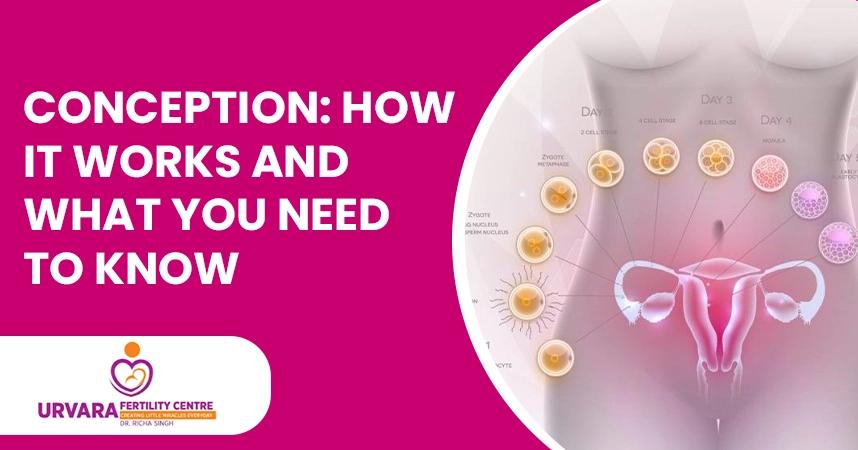
Conception: How It Works and What You Need to Know
Conception is the first step in the creation of a new life. This is when a woman’s egg is fertilized by a man’s sperm, beginning the pregnancy journey. For many couples, it is very important to understand how conception works, especially if they are trying to have a baby.
The process involves several steps, from ovulation (when the egg is released) to fertilization (when the sperm meets the egg) and then implantation (when the fertilized egg attaches to the uterus). Although conception may seem simple, it can be affected by several factors such as age, health, and timing.
In this article, we will explain how conception occurs, what factors influence it, and answer common questions to help you better understand this important process.
What is Conception?
Conception is the moment when a woman’s egg is fertilized by a man’s sperm. It is the first step in the creation of a new life and often marks the beginning of a pregnancy. While conception seems like a simple biological process, there are many factors involved and it only happens when everything is perfectly aligned.
The egg, which is released from the ovary during ovulation, must meet sperm in the fallopian tube. If fertilization occurs, the fertilized egg, or zygote, will travel down the fallopian tube and implant itself in the lining of the uterus, beginning the early stages of pregnancy.
How Does Conception Work?
The process of gestation can be divided into several stages:
- Ovulation: Every month, one of the ovaries releases a mature egg in a process known as ovulation. This usually occurs in the middle of a woman’s menstrual cycle.
- Fertilization: After ovulation, the egg moves into the fallopian tube. During this time, sperm ejaculated into the vagina during intercourse travels through the cervix into the uterus and eventually meets the egg in the fallopian tube. If a sperm successfully penetrates the egg, fertilization occurs.
- Zygote Formation: Once the egg is fertilized, it forms a zygote, a single cell that contains a complete set of genetic material from both the egg and sperm.
- Cell Division: The zygote divides into several cells to form a blastocyst, which travels through the fallopian tube to the uterus.
- Implantation: The blastocyst attaches itself to the lining of the uterus, where it continues to grow and develop into an embryo, eventually forming a fetus.
The Conception Process Explained
The process of conception is very complex and involves several biological mechanisms working together. Here is more detailed information on each stage:
- Egg Development and Ovulation: In a woman’s ovaries, eggs mature within follicles. During each menstrual cycle, one of these follicles releases a fully mature egg into the fallopian tube, a process known as ovulation. This is the time when a woman is most fertile, and most likely to conceive.
- Sperm Journey: During intercourse, millions of sperm are released. The sperm are designed to swim through the cervix and into the uterus, eventually reaching the fallopian tubes. However, only one sperm can successfully fertilize the egg.
- Fertilization: When a sperm enters the egg, a chemical change occurs in the egg membrane, which prevents other sperm from entering. This marks the beginning of fertilization, and a zygote is formed.
- Travel to the Uterus: The fertilized egg (zygote) divides into several cells and continues to travel through the fallopian tubes toward the uterus. This journey can take several days.
- Implantation in the Uterus: Once the blastocyst reaches the uterus, it must implant into the uterine lining to grow. If implantation is successful, pregnancy begins.
What is the Difference Between Conception and Pregnancy?
Although conception and pregnancy are related, they are not the same thing.
- Conception means the fertilization of the egg by the sperm, which takes place in the fallopian tube. This is the beginning of the pregnancy process, but it does not mean that the woman is pregnant yet.
- Pregnancy begins when the fertilized egg successfully implants itself into the lining of the uterus and begins to develop into an embryo. Pregnancy is confirmed when the woman misses a period and receives a positive result on a pregnancy test.
In short, conception is the starting point, but pregnancy begins when the fertilized egg successfully implants in the uterus.

Conception Calculator: How to Know Your Fertile Window
For couples trying to conceive, it’s important to understand the best time to try. A pregnancy calculator helps track ovulation and identify the most fertile days in a woman’s cycle, maximising the chances of a successful pregnancy.
Using a pregnancy calculator, women can calculate their fertile period based on their menstrual cycle. The fertile period is usually the five days before ovulation, including the day of ovulation.
The conception calculator is a useful tool, but it’s important to note that cycles can vary, and a regular menstrual cycle doesn’t always guarantee the same ovulation time every month.
Key Factors That Affect Conception
Although conception seems to be a natural process, several factors can affect its success:
- Age: Fertility decreases as you age, especially in women. Women over the age of 35 may have a reduced fertility rate, making it more difficult to get pregnant.
- Health Conditions: Conditions such as polycystic ovary syndrome (PCOS), endometriosis, or male infertility can significantly impact your chances of conceiving.
- Lifestyle: Diet, exercise, stress, and habits such as smoking or excessive drinking can also affect fertility.
- Frequency of Intercourse: Couples who have regular sex during their fertile period have a higher chance of conceiving.
- Timing: The timing of intercourse is important, especially around ovulation.
FAQs About Conception
Q1. What is the best time for conception?
The best time to conceive is during your fertile period, which is usually the five days before and after the day of ovulation. Using a conception calculator can help identify this time more accurately.
Q2. Can stress affect conception?
Yes, excessive stress can interfere with ovulation and overall reproductive health, making it more difficult to conceive.
Q3. How long does it take to get pregnant after conception?
Pregnancy is confirmed when implantation occurs, usually about 6 to 12 days after fertilization. If implantation is successful, the woman begins to experience early pregnancy symptoms.
Q4. What is the role of the sperm in conception?
Sperm are important for fertilizing an egg. Only one sperm can successfully penetrate the egg and initiate fertilization, leading to pregnancy.
Q5. When should I see a fertility doctor?
If you have been trying to conceive for more than a year and are having no success (or six months if you are over 35), it is advisable to visit a fertility specialist, like the team at Urvara Fertility Centre.
Conclusion
Getting pregnant is the first exciting step in the journey to becoming a parent. Understanding how conception occurs and knowing the key factors that affect fertility can help couples improve their chances of getting pregnant. If you are having trouble conceiving, don’t hesitate to contact experts like the team at Urvara Fertility Centre, the best IVF centre in Lucknow. With our advanced treatments and compassionate care, we are here to support you at every step of your fertility journey.
Content Created By:

Cyberbizz Technologies
Team - Content Curator

